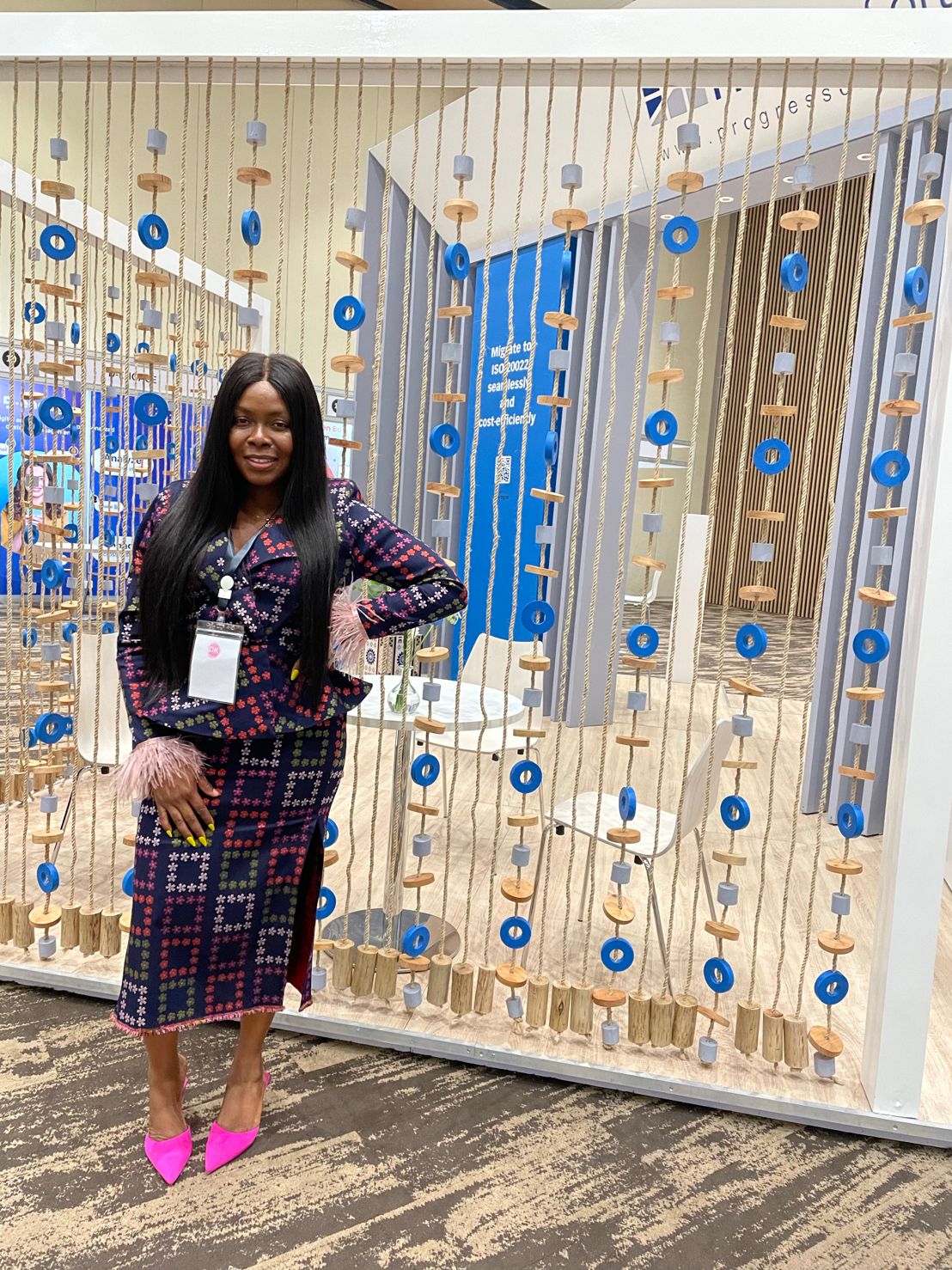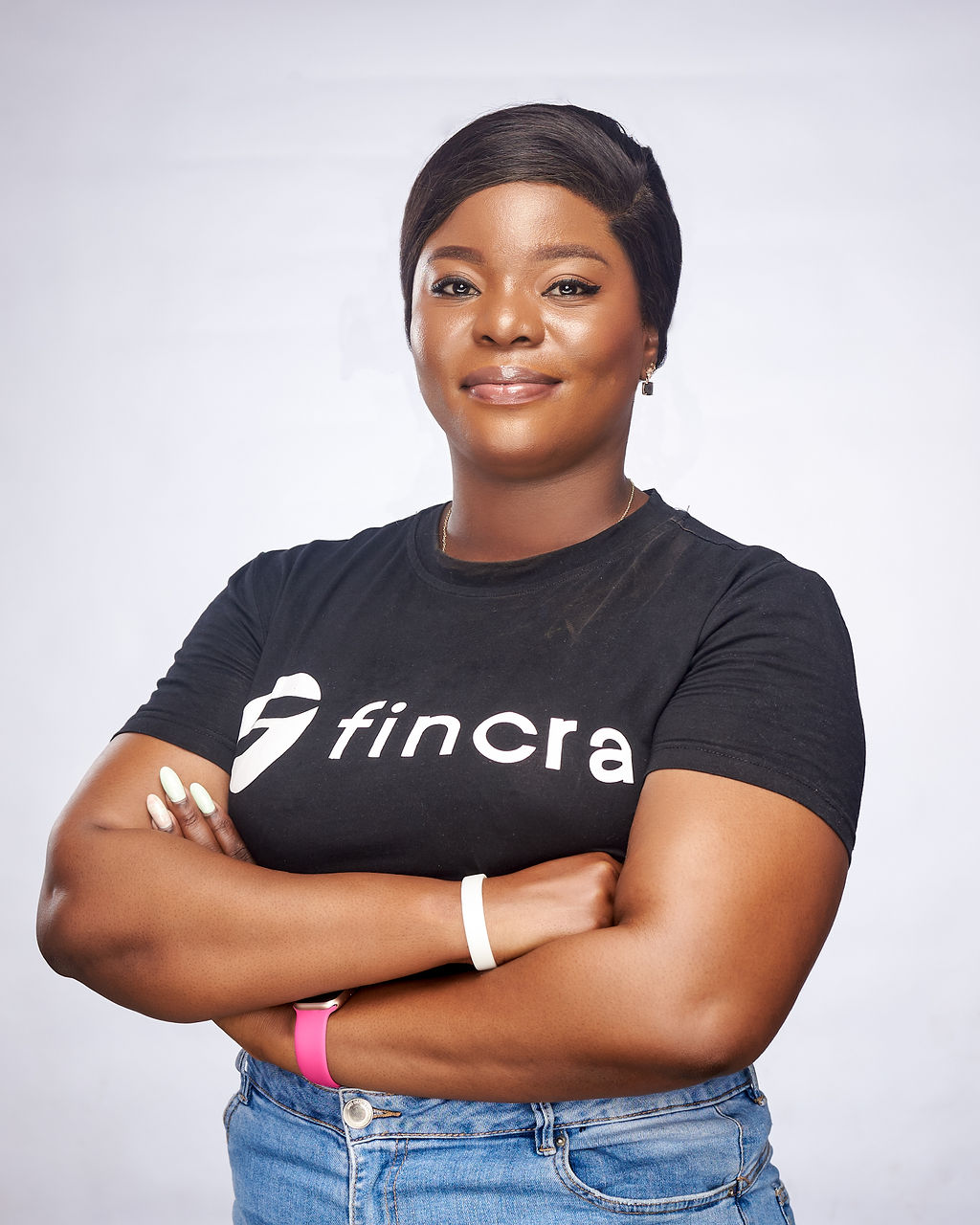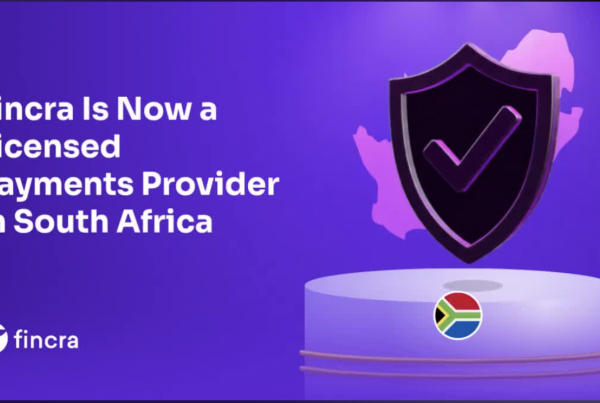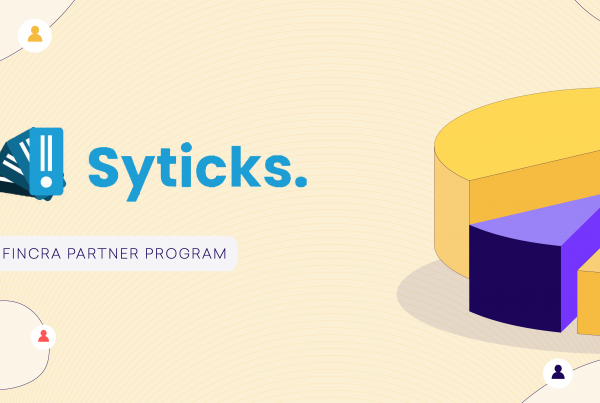Reflecting on the progress we have experienced at Fincra with embracing equity, we’re shining the light on the women in management positions at Fincra. These women have made significant contributions to our company and are inspiring role models for future generations of women leaders.
Jemima Adegoke – Head of Marketing and Communication

What inspired you to pursue a career in your field?
As a natural communicator, I have always enjoyed finding ways to connect with people and build relationships. Marketing provides an outlet for me to use those skills in a business context, helping brands build strong relationships with their customers and stakeholders. It’s exciting to be part of a field that’s constantly evolving and to have the opportunity to create innovative fintech marketing strategies.
What are some of your biggest accomplishments or contributions in your field?
I’ll highlight one of my most significant achievements in my current position. As Fincra’s marketing and communications manager, I oversee a team tasked with generating high-quality leads that result in revenue growth. Within a year, my team and I generated thousands of leads, some of which are classified as tier 1 merchants with a high volume of transactions worth millions.
For contributions in my field, I have contributed to a book titled “The Growth Handbook – Scaling Fintech in Nigeria,” alongside operators and leaders from some of Nigeria’s leading financial technology companies, with each contributor speaking to a different subject matter as an expert. As one of the few marketing leaders in Nigerian Fintech with experience in both business-to-consumer (B2C) and business-to-business (B2B) marketing, my contribution was essential to the book, in my dedicated chapter I share practical insights for marketing professionals in technology who want to work across B2C and B2B.
What do you believe are the most pressing issues facing women in management positions?
Lack of Representation: Women continue to be underrepresented in leadership positions, making it difficult for women to find mentors, network, and have role models to look up to. Because of this lack of representation, decision-making processes may be less diverse.
Limited Career Advancement: Women in management frequently face limited opportunities for advancement, as well as limited access to professional development programs and leadership training. This lack of support can hinder women’s advancement in their careers and contributes to a lack of diversity in top leadership positions.
What advice would you give to women who are just starting their careers?
My most important piece of advice is to be confident and assertive. Women frequently face stereotypes and biases that make it difficult for them to assert themselves in the workplace. Don’t be afraid to speak up, share your ideas, or assume leadership positions.
How do you think we can promote greater diversity and inclusivity in management positions?
Fostering An Inclusive Culture: Organisations can foster an inclusive culture by implementing policies and practices that promote diversity and inclusion.
Training Managers: Managers play a critical role in creating a culture of inclusivity in the workplace. To assist managers in building more inclusive teams, organisations can provide training on topics like unconscious bias, and inclusive leadership.
What steps are you taking to encourage more women?
Leading by Example: I believe that leaders should set a good example for gender diversity and inclusion. So I make sure that I am involved in relevant projects within the organisation that achieve diversity goals.
Promoting Women’s Achievements: I celebrate the achievements of women in my community or industry publicly. By highlighting these accomplishments, I hope to raise awareness about the important contributions that women make.
Providing Mentorship & Guidance. I never pass on an opportunity to participate in projects in my community or industry that provide mentorship and guidance to women just starting out in their careers.
Who are your role models or sources of inspiration in your field?
To mention a few, I look at people like Peace Itimi – Founder & Host of Founders Connect and Odun Eweniyi, Co-Founder/COO Piggyvest for inspiration
How can individuals and organisations support and promote gender equality in management positions?
Individuals and organisations should first become aware of their own unconscious biases that may be preventing women from advancing in management positions, and then address those biases. Training, mentorship programs, and the use of objective hiring and promotion criteria can help achieve this.
Individuals and organisations can also support and promote gender equality in management positions by actively developing and encouraging women’s leadership skills. This can be accomplished through leadership training, providing women with leadership opportunities and trusting them to deliver.
Jennifer Jemedafe-Salau – Head of Merchant Success

What inspired you to pursue a career in your field?
Passion and Adversity. A very interesting combination. I was first passionate about being in the customer service space and then I realised how much impact great service can have on a company, my level of interest in gaining knowledge and exploring the industry increased
The adversities I faced on my journey made me realise I had to pursue a career in the Customer Experience and Success industry because giving up on my pursuit would essentially be giving up on a chance for a better experience for everyday Africans as they interact with products and services.
What challenges have you faced in your career, and how did you overcome them?
My first challenge was that I lacked knowledge about service delivery as an industry and the different branches. I decided to fall in love with very successful global brands and I was obsessed with learning about how customer service and experience played a role in making them a ‘’desired brand’’. I could not afford the big training and certifications then, so I learned through following and studying Customer Experience leaders of leading brands.
My second challenge was ‘’people’’ I think this is an ongoing challenge for anyone in any industry. It manifests itself through the limitation of creativity when I need to innovate or come up with ideas. On some occasions I had to change my environment, other times I changed my mindset. through it all I’ve learned to reason with others, understand perspectives and become even more self-aware
What are some of your biggest accomplishments or contributions in your field?
Being able to share my journey with other women and show them a path to improved knowledge and increased income that has in turn empowered them, gives me a sense of fulfilment. I do this through a female-led community I founded called African Women in Technology Sales.
In my field, I have impacted brands across several industries and spoken about industry matters on global stages like the world financial innovation series, digibank summits etc, but I think what I like the most is the connections, friendships and networks I’ve built through my career whether as a consultant, an employee or a partner to six of the most amazing technology companies in the world today.
What do you believe are the most pressing issues facing women in management positions?
Hmmm, permit me to say ‘’Women’’ is a very pressing issue of ‘’Women’’. We need to permit, empower, support and facilitate our fellow women to not just go into management positions but to stay and thrive in management positions. The gender bias is changing, women are now being recognised as powerhouses in management. Organisations must amplify and scale this.
What advice would you give to women who are just starting their careers?
Love what you do, have the bigger picture in view and always put your best foot forward.
How do you think we can promote greater diversity and inclusivity in management positions?
Covid changed the way we see work globally and then Technology plays a really important role here with remote hiring tech solutions now organisations can easily hire compliantly from at least 150 countries thereby enabling real diversity.
As women however we must prepare and equip ourselves to come to the main stage, the boardrooms and the c-suite positions. The more ready we are mentally, emotionally, skillfully and experience-wise, the more ready we are to take on the opportunities when they come.
Who are your role models or sources of inspiration in your field?
Aditi Ravi – Senior Director & Head of Channel Partnerships at MoEngage Inc, she’s so feminine yet so strong, she’s like a sister to me, consistently telling and showing me how to reach for the stars.
Jennifer Rhima – Director of Partnerships at Apollo.io. She’s a rockstar. She grew Apollo’s average partnership revenue by 1,641% as a one-woman team. Somehow she believes and tells me I can do incredibly amazing things. She smiles a lot too, lol I like that.
How can individuals and organisations support and promote gender equality in management positions?
I think starting at the top will help… More women should be considered for C-suite roles in key teams Like Sales, Finance and Legal, Engineering and Customer Experience, Products etc. All organisations must also be intentional and practical about enabling gender balance, like say it, do it, be it. As individuals, be kind to one another regardless of their gender.
Sunmisola Akerele – Head of People Operations

What inspired you to pursue a career in your field?
My Journey to People Ops was really unprecedented, my mind was set on being an investment banker but God definitely had other plans. So after an internship at a Teleco, my erstwhile manager was convinced it was my strong suit and took me under her tutelage. When I look back now, it honestly was the most primo decision ever. My role gives a unique perspective into the business and a strong understanding of priorities and challenges, this way deep and meaningful impact and influence is possible.
What challenges have you faced in your career, and how did you overcome them?
Helping teams embrace change with grace and ease.
Change is a shapeshifter, the unknown brings about feelings of uncertainty and anxiety. But whether managerial, structural or process change, people ops plays a significant role in galvanising employee happiness and cooperation through change. Also, constantly upskilling to meet the changing needs of the business.
The solution? There’s no single right answer. But an effort to communicate frequently and transparently before, during, and after times of change is a good place to start. Provide fair warning of changes to come, and equip everyone with the competencies they’ll need to deal with change.
What are some of your biggest accomplishments or contributions in your field?
My proudest contributions in recent times have centred around:
Cultivating Purpose Culture and Value by collectively establishing and radiating Fincra’s purpose, taking employee experience to the next level and rebalancing talent resources while mapping talent to value.
Also, fostering decision-making and optimising structure. How? By driving strategic workforce planning and talent magnetism, simplifying all aspects of the employee life cycle, growth and performance management, and playing the role of both driver and facilitator by capturing speed in decision-making and execution.
What do you believe are the most pressing issues facing women in management positions?
Being a woman in management, you must be able to work under stress and use psychological qualities that allow you to expand your own capabilities.
We all have many inner barriers. First, it is the framework of social stereotypes and our beliefs about ourselves. Culturally, we’ve been conditioned since childhood to conform and agree; that’s hardly a personality trait for success in big business. Top management requires “grit”.
There are a number of psychological traits that often prevent women from being effective managers. This is primarily emotionality, a tendency to doubt our actions, kindness (often perceived as weakness), etc that prevent us from making unpopular decisions.
At the same time, women have a whole set of traits that help us stay successful in management. We are very persistent, open to new experiences, hardworking, energetic, responsible, sociable and organised.
Overcoming perfectionist tendencies and imposter syndrome. Sometimes, it shows up as being unable to internalise accomplishments. One can easily overcome this by first getting to the root of why this belief exists, then adjusting by making accurate assessments and getting feedback from other leaders to confirm strengths. Speaking of challenges, many women also struggle with garnering support from other women. My advice to us women is to support and empower each other, we must be just, and show togetherness and excellence.
What advice would you give to women who are just starting their careers?
-Cultivate Confidence: Confidence is a better predictor of career success than competence. That’s not to say that competence isn’t important, research shows that confidence makes up 79% of your gravitas.
-Play to your strengths, listen and improve on what others tell you that you are good at. Pay attention to what’s on your calendar that excites you.
-Unhook from criticism and praise, find self-confidence from within.
How do you think we can promote greater diversity and inclusivity in management positions?
An interesting way we have reinforced this is through the creation of more Inclusive workplace policies, empowering managers with behavioural skills that will contribute to building an inclusive culture and more importantly, holding leaders accountable for the progress.
What steps are you taking to encourage more women?
At an organisational level, with the CEO at the forefront of this campaign, advocating for a balanced gender ratio, and intentionality in our everyday decisions as it affects the personal lives of the men and women at Fincra.




